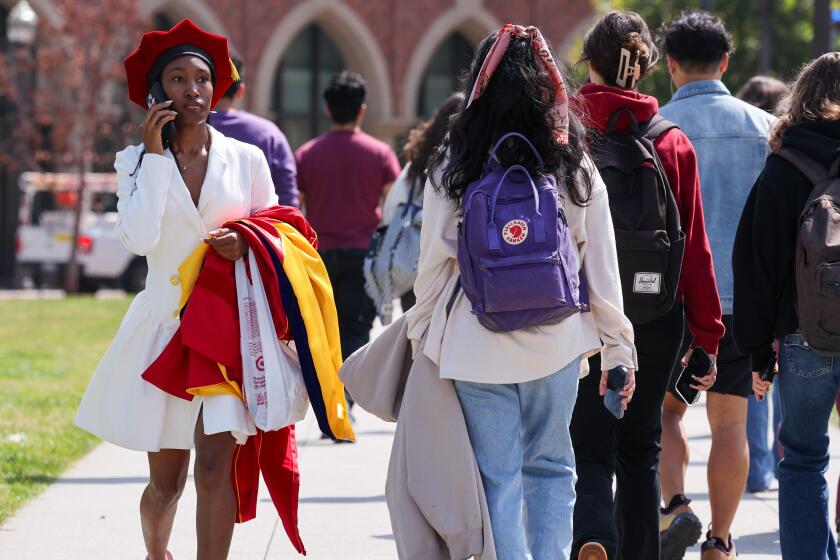The commencement USC students, and their parents, should have had

- Share via
Last weekend as a parent, and 36 years ago as a student, I went to Michigan Stadium to be among tens of thousands for the annual graduation ceremony of the University of Michigan.
On Saturday morning, I walked with my wife and daughter — and 87-year-old Grandma Nora — the mile from campus to the Big House, waited in a long security line and then climbed the steps to row 96, the top of the bleachers. Fifteen thousand students from 26 of the university’s schools were on the football field, my son among them. More than 60,000 extremely proud parents and loved ones sat in the stands.
I do not know the precise risks USC, Columbia and other universities faced that caused them to cancel their school-wide commencement ceremonies this year. But what my family experienced on Saturday underlined that the loss will be substantial, and it extends well beyond the personal.
The vote followed a nearly three-hour meeting Wednesday in which USC’s faculty members criticized the decisions of President Folt and provost Andrew Guzman.
After the obligatory “Hail to the Victors” rendition, and the flag raising, when all were seated and the speeches began on Saturday, I teared up thinking of our son’s measly high school graduation in spring 2020. We watched a pretaped video from his high school in our kitchen, and that was it. The opportunity to be captain of his ultimate frisbee team senior year, gone. Same with high school prom. Never a goodbye or thank you to his favorite history teacher. No graduation parties. And his first year in Ann Arbor was just as riven by COVID-19.
But four years later, the pomp and circumstance were very satisfying. Some of the speeches were very good, others less so. And, yes, there was a protest — about 50 among the thousands of graduates unfurled flags and banners and chanted in support of Palestinian rights. A plane circled the stadium with a banner saying “We stand with Israel,” and a later a banner (perhaps pulled by the same plane) read “Divest from Israel.” Yet the speakers’ voices were heard; the students were honored.
At a college graduation, parents need to be able to share a spiritual high-five on the enormity of mentoring (and paying for) a child’s education. And students need to be with peers for a grand public celebration of all they’ve achieved.
At many universities across the country, graduation for the Class of 2024 will feel more like making it through airport security than a procession through a free-flowing campus green or a cheering stadium crowd.
The universities that have canceled their main-stage events may counter that they are offering smaller, more intimate ceremonies that also publicly acknowledge the next generation. That’s nice, and before and after the Big House spectacle we attended department-only events. I met our son’s favorite professor and hugged his sophomore-year roommates and their parents. But department gatherings are far from an adequate replacement for community-wide ceremonies.
When I got my bachelor’s degree in 1988, I remember that we students talked so much during the commencement address — while beach balls bounced from row to row to row of capped and gowned graduates — that the speaker admonished us for being rude. (He was right.) There were protests then too: The biggest demonstration was reserved for former U.N. Ambassador Jeane Kirkpatrick, who had helped engineer the U.S. military role in Central America. I was a student activist — winning a campaign for student government president on a platform that the university should not be able to expel students for non-academic protest activity.
Yet I didn’t view the graduation ceremony as a referendum on the school or my free speech and assembly rights, or national defense policy either. It was a public acknowledgment of a personal milestone, and it was meaningful.
Campus administrators nationwide struggle to uphold principles of free expression amid pressure from those who claim speech, or potential speech, can subject students to harm.
Saturday night, I carefully composed the obligatory social media post of the day’s events for friends and family who couldn’t be there. I purposely didn’t include images or mention of the protests. But sure enough, the protests were what generated front-page coverage across the nation.
Signs and chants indeed offer sensational media images. VIPs and their speeches may be rudely interrupted. Protesters may exercise their rights and make a mess of the program. Security may be tested. But absent profound dangers, cancellation or curtailment do not outweigh the benefits of a public celebration of education and excellence.
College graduation at USC, or Columbia or Michigan, is a once-in-a-lifetime milestone; a balkanized approach doesn’t do it justice. Administrators should not cause students and their families to settle for less.
Ken Weine lives in Brooklyn and is a communications consultant.
More to Read
A cure for the common opinion
Get thought-provoking perspectives with our weekly newsletter.
You may occasionally receive promotional content from the Los Angeles Times.












